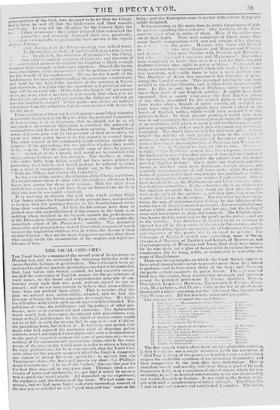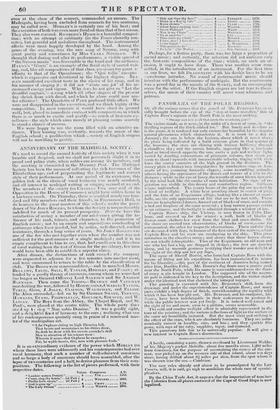THE VOLIAL CONCERTS.
THE Vocal Society commenced the second year of its existence on Monday last, and we celebrated the returning birth-day with no inconsiderable feelings of gratification. Those who have been ac- customed to read our musical speculations, need not to be reminded, that, long before this Society existed, we had earnestly recom- mended the association of English singers for the pet formance of vocal music, on the broad and coniprebensive principle of em- bracing every style that was good, without regard to age or country : and we are vain enough to believe that those exhorta- tions were not without their effect. This is certain—that the plan we advised was, substantially, adopted, and we had the pleasure of heing the first to announce its completion. We knew the difficulties with which such an attempt would be attended. The indolence of some, the indifference and the jealousy of other pro- fessors, were to be encountered and overcome. The fashionable world would look down upon the attempt with supercilious con- tempt or frigid indifference; for the object of such a society would not be to fill in with the stream, but to app ,se it—not to follow the prevailing taste, but to lead it. It was to be antit ipated, that many who had enjoyed the exclusive right of directing public concert., would not regard with complacence such a determination on the part of singers to assume the reins of government,—to say nothing of the numerous and contending claims which the com- posers of the present day a mild urge in order to obtain a hearing for their productiens: for be it remembered, that the Vocal Con- certs alone (at the present moment) afford the English composer any chance of giving his work.; publicity ; as against him the Theatres are shut—the Ancient Cjiiecrts are shut—t Philhar- monic Concerts (aW' ss he be of the "select," who are this year for ne first time engaeed to write) are shut. Through such a suc- cession of rocks and quickstuels, we saw that it would be 110 easy task to guide the vessel aright. All depended on the experience, the vigilance, and the firmness of the crew. We had some mis- givings, but we had more hope: and every succeeding concert of the last seasen satisfied us that "good men and true" were at the
helm ; and the Enterprise came to anchor with colours dying and richly freighted.
It was amusing, in the mean time, to watch the progress of pub- lic opioien r ,garding theee coneerts. Our brethren of the Peese scarcely t.:iew what to make of them. Most of the critic,: were out of their depth. Here were composers of whese names they never heard—compositions with new and strange titles, dug up, as it we:- • ee the grave. HANDEL tiler knew and 13 NTIOP tile': • Who were Clnutoxi and NIolteitv and 'Levi? I and Geee N7- They were feniliar with Roesler' and BELL I NI ; but wilt t LEO and CAltl'iSIM I and MeaeNzio ? The critice were completely at fault: they were at a loss for their cue, and doubtful whether they ought to praise or blame. netritately for them, a circumetanee has occurred which will rewler the;t- course less uncertain, and eeable them to take a mose doe:,101 tome The Diachese of KENT has announced her inteetion of petrc- nizing the Vocal ('oie This important intelligence has been notified in the Court Circular, and is (therefore) unquestieuahly true. In this nneect, her Rival Highness shows mere good sense than tnoet of our English nobility. It might have been imagined, that a society comprishig the first Englisii artiste of any (lase, asst tabled for the avowed purpose of prodecing those works which, though of native growth, all ei \.i!izea na- tions have noittel to admire, alight have struck a chord in the hearte Of Eti hsri nobles, which tvould have responded to title patriotic. feeling. In their present position, it would have beea wise in our aristocracy thus to have appeared :non;; the supporters or an institution whit whit It so ninny pemd recollections, se lastly patriotic sympethice, and so niuch pure enjoyment are eonstawly
assoeiated. AVe ehouhl have for their own sale•••, irate beheld the nehility of rank pnying tribute to the nel.;!i:y of genius—t . have steel our IT. tiweene and Rc,SEr.LS ao,1
i,te: to the Comp', itio,::: Putter:Le and Wieser: litener. Feeland we look fur this in vain. /1/eeeese•
is right ± c Exel.usire system has, like a leprosy, oversinee.
the laud, awl is one of the chief causes of that prof mu leaked of the aristotency which distinguishes the present front any firm wr
period of Eitg hell history." Their smiles are bestowed and their money is lavished often 1.1D011 collrth-rate fireien sineers, and generally upon composers of still lower reek while the nobleq works of genius which their own country has product:4,as well a ;
its most distinguielwil artiste, are neglected and scorned. Oat of throe hrn.iiech Pee..s, the Philharmonic and weal C■meorty, num-
ber about ten subscribers. To these Soeicties this is au affair of we the smallest liniment: they have timnd out that they can exist
witheut tieu help of the aristoeue y, and they have ceased to trouble their heads on the subject. But the etrect has linen to in- crease the sum of anti-aristocratic feeling, by the addition of the entire class of English musical professors. Interest and habit may induce a little on wail cringing and fawning, but the feeling of scorn and resentment is deep and universal. The English musi- cian knows that be tuust look to the people as his patrol 4, and not to the nobility. The Dutchess of les.Ne is riela iu scenting to interest herself in the peerrese of the arts in this contact', awl in affording its future Queue an op; orttleity of estimatiee the genius and character of the people she is tie nitwit to govern. The Severeign of England should kilo sentething more of Ste AK- SPEARE addAllures, of NEWTON and Loci E , of REYNOLDS and GAINSBOROUGH, of PURCELL and ArNE, than their mere names; for he Who feels not a glow of honest pride in calling these men countrymen (be he king, noble, or commoner) is unworthy the name of Englishman.
There are two principles on which the Vocal Society appear to have acted throughout—never to pro wise more than the intend to perform—and to have every thing of the best : and Olese are the pretty certain passports to public favour. The ie •I band has, this season, been considerably increased, and numbers among its principal perfin mars T. COOKE (Leader), DsNo0, MOUNTAIN, LaNnenv, Howene, NICHOLSON, G. Ciente, Wine. MAN, MACKINTOSH, and Pnerr: while in the list of twealwrs we observe not a sinele secession, but the eddit ion of Mrs. SE::17IN and Miss Wooneeere All this betokens union and prosperity.
The scheme of tele Concert was as follows-
1. Poe o. " liosanua ti t'io sou or Davi],"
9. We..." rh.• 'tee,"
3. Sbnz. Mr. “11,LAMY.•• Del mivar,,iar ctrl %woo.-- II vv.,
4. 10! the 14,titig." 5. 1ngrat. .
6. Q Ow Valley,' ihe. CAT.T.11,11'. 7. c:.:.,. MO.$) 11AVON.
iarinott. Mr. WILLMA.:.
9. Hymn." I ie Ilarmonie ace Spline:en," A. Itoviti:n,. 10. Cant liworAm 11. .• To sliorton Win1:4'ssatne.“."
Q to Hio," Agitiedi in sotto," Pagan. M,4i CLARA NOVELL°. •• 14. lc: • " STEVEN,. • spotted snake 15. Final% Ole Zttabrviale, Mo7AuT.
The first remark which offers itself on this admirable selectiou, is that it coneetis not a single repetition (with the exception of " Mad Tom ") of' any of the pieces we heard last year ; a bee which evinces the creditable exertions of fee immaging Committee, and their competence to the task they have undertaken. Here is abundant variety and novelty, and every thing is good of its km& Gninoss-s Aet leen is a specimen of church music, whir+ for true sublimity, as well as learned counterpoint, never was surpassed by any writer, Ene tisk or foreign. It was right in the Society to be- gin with such a manifestation of native strength. The Glees No. 6 and 14 are acid known and established .fivouritee. The latter,
even at the close of the concert, commanded an encore. The Madrigals, having been excluded from concerts for two centuries, may be called new. MentLEY's is certainly one of his best; and the execution of both was even more finished than that of last season.
• They also were encored. ROMBERG'S Hymn is a beautiful composi- tion; with no attempt at sublimity (as the Times absurdly con- ceits), but graceful and melodious throughout. The instrumental effects were most happily developed by the band. Among the gems of the evening, was the new sung of SPOHR, sung with great purity and correctness by Miss CLARA NOVELLO. We thought that during and after its performance, a visible spread of " the S P011 R mania" was discernible in the band and the audience. HAvoN's "Gloria" is an example of the florid style of sacred writ- ing, and, like all compositions of that class, possesses too great al affinity to that of the Operahouse; the " Qui tollis" excepttt. which is expressive and devotional in the highest degree. ERA- HAM manifested excellent taste in the choice of his song, and in his manner of singing it : it did not "abate one jot" of his ac- customed energy and vigour. Why does he riot give us " Let the dreadful engines,"—a song which all other singers of the present day shrink from with dread, and which he alone could now ren- der effective? The Quartetto of PAER produced little effect. We were not disappointed in the execution,and we think highly of the composition. In most concerts it would have stood its ground well; but, placed in immediate contrast with compositions in which there is so much to excite and gratify—so much of first-rate ex- cellence—the style %Mai aims merely at pleasing seems scarcely to stand a chance of success.
We were happy to see the room filled with an attentive au- dience. Their leaning was, evidently, towards the music of the English school ; a predilection which u society of English singers will not be unwilling to gratify'.



















 Previous page
Previous page